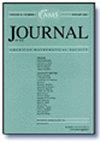Geometric stochastic heat equations
IF 3.5
1区 数学
Q1 MATHEMATICS
引用次数: 44
Abstract
We consider a natural class of $\mathbf{R}^d$-valued one-dimensional stochastic PDEs driven by space-time white noise that is formally invariant under the action of the diffeomorphism group on $\mathbf{R}^d$. This class contains in particular the KPZ equation, the multiplicative stochastic heat equation, the additive stochastic heat equation, and rough Burgers-type equations. We exhibit a one-parameter family of solution theories with the following properties: - For all SPDEs in our class for which a solution was previously available, every solution in our family coincides with the previously constructed solution, whether that was obtained using It\^o calculus (additive and multiplicative stochastic heat equation), rough path theory (rough Burgers-type equations), or the Hopf-Cole transform (KPZ equation). - Every solution theory is equivariant under the action of the diffeomorphism group, i.e. identities obtained by formal calculations treating the noise as a smooth function are valid. - Every solution theory satisfies an analogue of It\^o's isometry. - The counterterms leading to our solution theories vanish at points where the equation agrees to leading order with the additive stochastic heat equation. In particular, points 2 and 3 show that, surprisingly, our solution theories enjoy properties analogous to those holding for both the Stratonovich and It\^o interpretations of SDEs simultaneously. For the natural noisy perturbation of the harmonic map flow with values in an arbitrary Riemannian manifold, we show that all these solution theories coincide. In particular, this allows us to conjecturally identify the process associated to the Markov extension of the Dirichlet form corresponding to the $L^2$-gradient flow for the Brownian loop measure.几何随机热方程
考虑一个自然的由时空白噪声驱动的$\mathbf{R}^d$值一维随机偏微分方程在$\mathbf{R}^d$上的微分同构群作用下形式不变。这类特别包含KPZ方程、乘法随机热方程、加性随机热方程和粗略的汉堡型方程。我们展示了具有以下性质的单参数解理论族:-对于我们类中所有以前可用解的spde,我们族中的每个解都与先前构造的解一致,无论是使用It\^o微积分(加性和乘法随机热方程),粗糙路径理论(粗糙汉堡型方程)还是Hopf-Cole变换(KPZ方程)获得的解。-在微分同构群的作用下,每个解理论都是等变的,即把噪声作为光滑函数进行形式化计算得到的恒等式是有效的。-每个解理论都满足It\^o等距的模拟。-导致我们的解决理论的反项在方程与可加性随机热方程的主导顺序一致的点上消失。特别是,第2点和第3点表明,令人惊讶的是,我们的解理论具有类似于同时适用于SDEs的Stratonovich和It\^o解释的性质。对于具有任意黎曼流形值的调和映射流的自然噪声摄动,我们证明了所有这些解理论是一致的。特别是,这使我们能够推测地识别与布朗环测量的L^2梯度流对应的Dirichlet形式的马尔可夫扩展相关的过程。
本文章由计算机程序翻译,如有差异,请以英文原文为准。
求助全文
约1分钟内获得全文
求助全文
来源期刊
CiteScore
7.60
自引率
0.00%
发文量
14
审稿时长
>12 weeks
期刊介绍:
All articles submitted to this journal are peer-reviewed. The AMS has a single blind peer-review process in which the reviewers know who the authors of the manuscript are, but the authors do not have access to the information on who the peer reviewers are.
This journal is devoted to research articles of the highest quality in all areas of pure and applied mathematics.

 求助内容:
求助内容: 应助结果提醒方式:
应助结果提醒方式:


